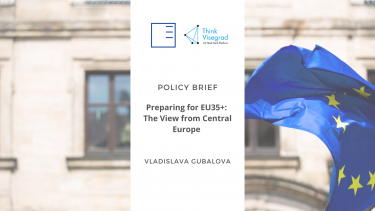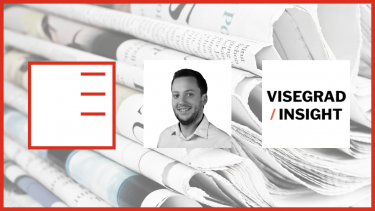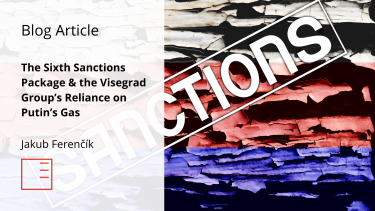Policy Brief | Preparing for EU35+: The View from Central Europe
Despite the historical support of EU enlargement policy by the Visegrad Four (V4), these Central European states are now faced with the challenge of reconciling their stances with the new realities of the process. As Ukraine and Moldova opened their accession negotiations, the EU seems to be torn on the questions associated with the future enlargement(s) - institutional reforms and changes within the EU budget. Transitioning from economic beneficiaries to potential contributors, the V4 states must evaluate the potential political and economic impacts of new members on both the EU and their domestic levels. Writes and proposes recommendations Vladislava Gubalova from GLOBSEC.
Zjistit víceVisegrad/Insight | Tractors Trending: V4 Populists Appropriate the Farmers’ Protests Ahead of the EP Elections
The populist camps in the Visegrad Four countries have used the farmers' protests in their populist campaigns for the European Parliament elections in June. A fundamental change to the last EU elections in 2019 is visible in the politicians' messages towards the people, with social media taking over the classic platforms such as television, press or radio. Project Manager of Global Europe programme at EUROPEUM Institute, Oszkár Roginer-Hofmeister, wrote an article on this topic for Visegrad/Insight.
Zjistit více
RTVS | The Future of the Visegrad Group
Differences on key issues between the leaders of the Visegrad Four countries are now being widely discussed in the context of the ongoing summit in Prague. How the relations between the countries will develop, whether we are heading towards the disintegration of the V4 or whether this is an eternal partnership of reason, was analysed by Žiga Faktor, Deputy Director and Head of the Brussels Office, for the RTVS podcast Z prvej ruky.
Zjistit více
Discussing Ukraine in V4 mainstream media: The future vis-à-vis European integration
The project assesses the production, distribution and consumption of news on Ukraine’s future vis-a-vis European integration by the V4 mainstream media. The aim is to designate both dominant and marginalized narratives, while also analyzing their impact via focus groups. The findings will be presented to stakeholders in order to improve reporting and increase the audiences’ access to information.
Zjistit více
Decarbonization of the Industrial Sector: Sustainable Finance as an Opportunity?
EUROPEUM Institute for European Policy partnered up with the institutions from the Visegrad Group countries and now leads the project consortium. The main objective of the project is to identify priority policies that will enable the decarbonisation of heavy industry in a way that is consistent with the commitments of the Visegrad Four countries to limit future global warming to 1.5 °C. To reach this objective, partners conduct original research and engage the local stakeholders.
Zjistit více PNGVISEGRAD/ISIGHT: Czechia and Slovakia lead the ways
Our senior researcher Jana Juzová wrote an article for VISEGRAD/INSIGHT on "The Czech Republic and Slovakia in the lead". Since July, the Czech Republic has held the presidency of the EU Council and Slovakia the presidency of the Visegrad Four. Although the V4 is now in the shadow of Czech and Slovak foreign policy, this does not mean that it is less important or that it is falling apart. However, the V4 crisis triggered by Hungarian Prime Minister Viktor Orbán may be an opportunity for the Czech Republic and Slovakia to determine the direction of the Visegrad Four.
Zjistit víceBlisty: Rozhovor Britských listů 505. Are the Visegrad Four irrevocably discredited?
The head of our Brussels office Žiga Faktor gave an interview to the British Gazette. In the interview they compare how the Czech Republic and Slovenia are dealing with the legacy of populist governments.
Zjistit více
Visegrad Insight: Slovenia’s New Government Rejects ‘Orbán’s Visegrad’
The head of our Brussels office, Žiga Faktor, commented for Visegrad Insight. Žiga Faktor points out that the centre-left opposition parties united in an informal coalition known as the "Constitutional Arch Coalition" have not coordinated as closely as the opposition parties in the Czech Republic, which have formed two coalition blocs, the centre-right SPOLU and the centrist PirStan.
Zjistit více
BLOG: The Sixth Sanctions Package & the Visegrad Group’s Reliance on Putin’s Gas
Jakub Ferenčík wrote a blog on the current topic: The Sixth Sanctions Package & the Visegrad Group’s Reliance on Putin’s Gas. Russia's aggression in Ukraine has necessitated another package of sanctions, this time in the energy sector. Due to the lack of alternatives for gas supplies, the Visegrad Four countries had a problem with the implementation of the latest sanctions package. In the end, the EU found a consensus and introduced exemptions for the Czech Republic, Slovakia and Hungary.
Zjistit více PDF
World Politics Review: Germany’s New Government Could Spell Trouble for the Visegrad Four
The director of our Brussel's office, Žiga Faktor, gave a commentary to World Politics Review on their new article Germany's New Government Could Spell Trouble for the Visegrad Four. The New German Government had been getting positive reviews even before it took office in early December. But not everyone is pleased with the new coalition government, one of which is Viktor Orban.
Zjistit více
Staroměstské náměstí 4/1
Praha 1 - Staré Město
110 00
tel.: +420 212 246 552
email: europeum@europeum.org
https://www.europeum.org









